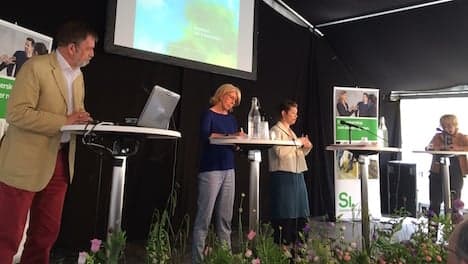Why is Sweden still working with Russia?
Relations between Russia and the EU might be tense, but Sweden is working hard to build connections - from the ground up.

For many Swedes, their view of Russia is simple: it’s a colossal military power on their back doorstep. Under President Vladimir Putin it has become more authoritarian, started a war in Ukraine and taken backward steps on issues such as gay rights.
The knee-jerk reaction to this might be that Sweden should distance itself from Russia - and Swedish foreign minister Margot Wallström has been forthright in her condemnation of Russian activity in Ukraine. Yet when it comes to civil society, the organizations that promote Swedish cooperation in the world are talking up the benefits of working together.
For the Swedish Institute (Si), which promotes cultural exchange, and development cooperation agency SIDA, this is no time to stop working with Russia:
“You need to keep up a dialogue, because that builds trust. The conditions for that change all the time - but not only in Russia: everywhere,” Annika Rembe, director general of the Swedish Institute, told a seminar at the Almedalen political week in Gotland on Monday.
Far from pulling back from Russia, the Swedish Institute is actually increasing its focus on cultural exchange and organizing events about broad societal questions. It also sponsors Russian students and researchers to visit Sweden and is increasing its activities in the Russian language.
A new survey suggests that Sweden should at least get a favourable hearing from Russians. Some 67 percent of Russians have a positive or very positive attitude to Sweden, according to the poll from the Levada Centre. By contrast, a separate poll showed that asked people for their views on the EU and US showed much more negative views - 64 percent had a negative view of the EU; 73 percent had a negative view of the US.
But the situation in Russia means that the Swedish Institute and SIDA have had to adjust, putting greater emphasis on working with local government and civil society. This means that Sweden focuses less on areas like policy issues and administrative reforms which often require more direct cooperation with the central government.
But, according to Elsa Håstad of SIDA, there are plenty of areas that are still ripe for cooperation, like access to clean drinking water, female empowerment and increasing women’s participation in political life.
Share Music, a Swedish group that runs courses in dance and drama which include disabled people, is one of the organisations that the Swedish Institute is cooperating with in Russia. The organization held two workshops in Archangel this February, and jointly produced a photo exhibition, AccessAbility, which told the stories of young Swedes and Russians with disabilities.
Director of Share Music Sophia Alexandersson says her experiences in Russia have been hugely positive:
“We’ve been met by an enormous curiosity and a willingness to exchange experiences. Within dance and inclusive dance, I’ve seen things I’ve never seen in Sweden,” she says.
This article was produced by The Local in partnership with the Swedish Institute.
This content was paid for by an advertiser and produced by The Local's Creative Studio.

Join the conversation in our comments section below. Share your own views and experience and if you have a question or suggestion for our journalists then email us at [email protected].
Please keep comments civil, constructive and on topic – and make sure to read our terms of use before getting involved.
Please log in here to leave a comment.